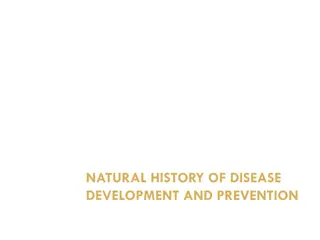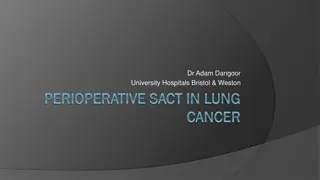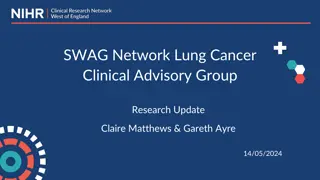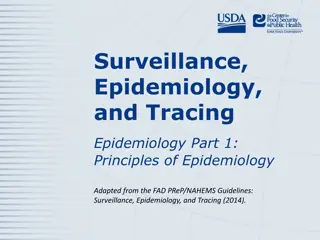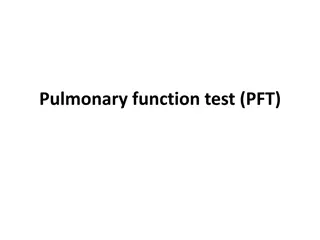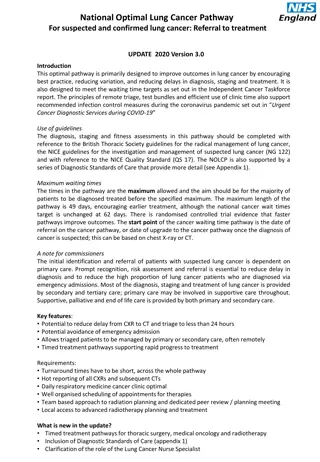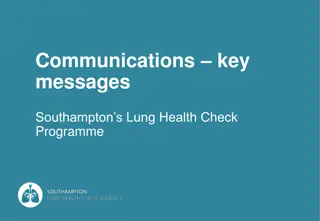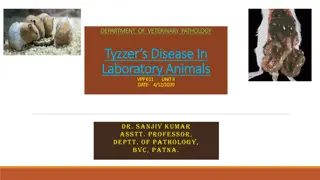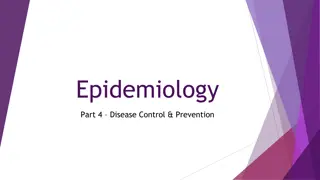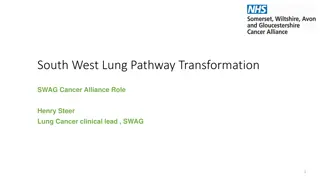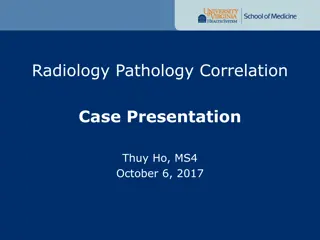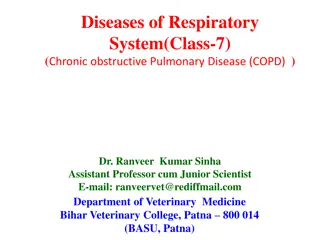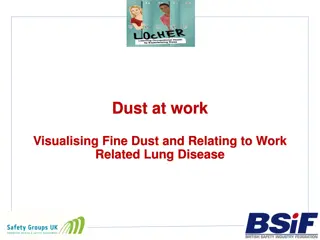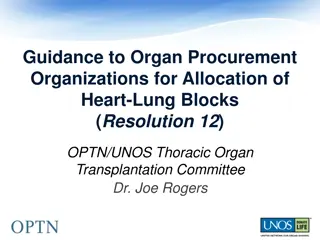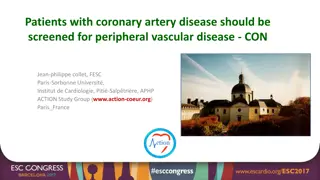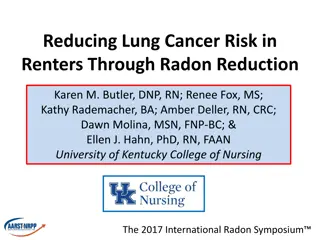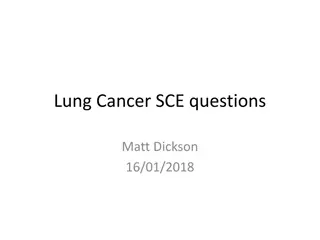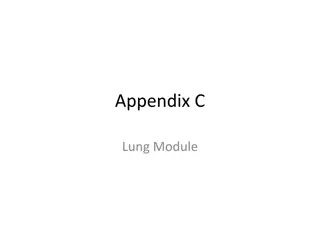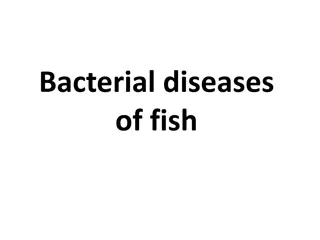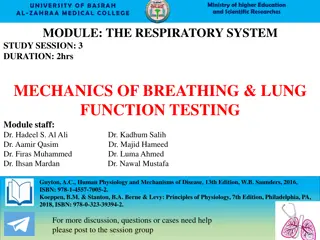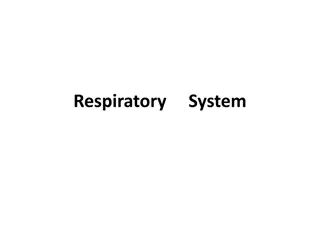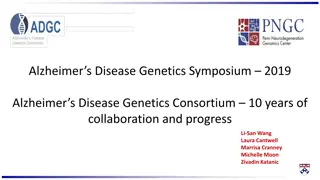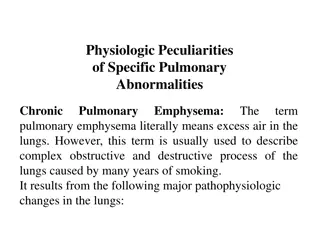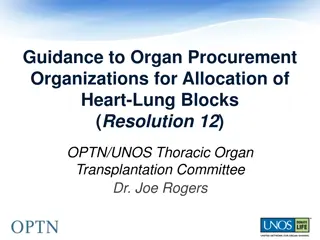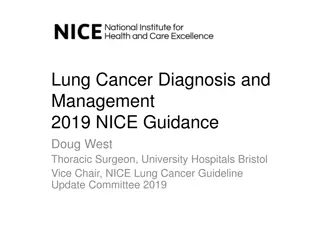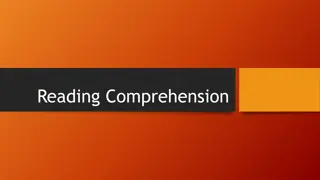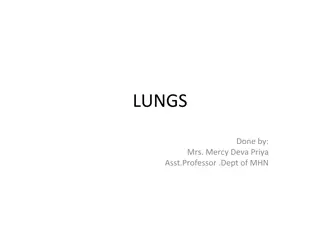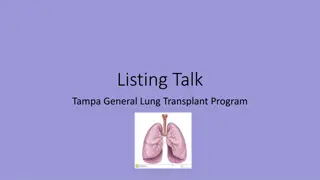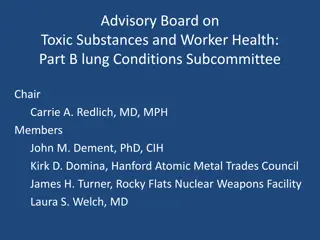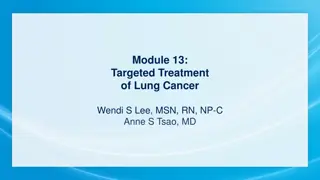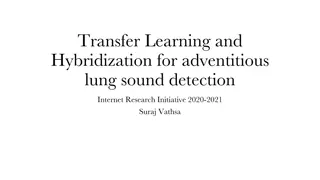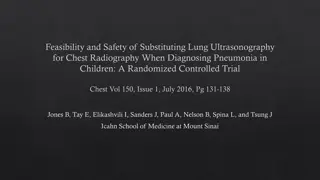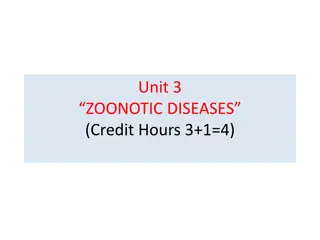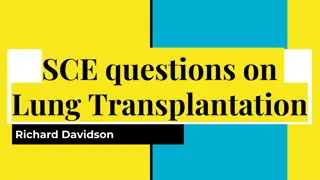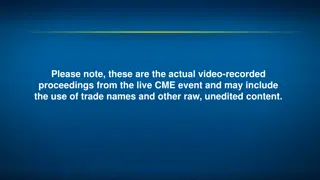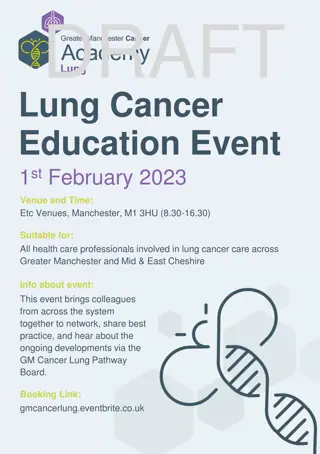Understanding Lung Cancer Screening Programs and Criteria
Screening for lung cancer is essential for early detection and intervention. CT scans have shown promise in reducing mortality rates, especially in high-risk populations. While challenges like cost and radiation risk exist, initiatives like the National Lung Screening Trial have demonstrated the eff
4 views • 28 slides
Understanding the Natural History of Disease Development and Prevention
The natural history of disease development outlines the progression of a disease in an individual without intervention, from exposure to outcome. Learning objectives include defining prevention terms, understanding disease severity, prevention levels, and intervention measures. Studying disease prog
4 views • 16 slides
Advances in Perioperative Treatment of Lung Cancer: A Comprehensive Review
Explore the evolution of perioperative treatment for lung cancer from historical perspectives to current advancements. Learn about the efficacy of different chemotherapy agents, immunotherapies, and adjuvant treatments, along with the impact on patient outcomes and resectability criteria. Discover t
1 views • 19 slides
Latest Research and Studies on Lung Cancer - Update May 2024
This research update includes information on national recruitment to lung cancer studies, comparison of national vs. regional recruitment, and detailed descriptions of various studies and trials related to lung cancer. The studies cover areas such as treatment advancements, observational studies, ma
2 views • 13 slides
Principles of Epidemiology: Understanding Disease Occurrence and Surveillance
Epidemiology is the study of disease patterns, factors influencing disease occurrence, and the core functions of surveillance, field investigation, and analytic studies. It involves understanding disease characteristics, natural history, and evaluating the effectiveness of activities to mitigate dis
1 views • 25 slides
Comprehensive Overview of Pulmonary Function Tests (PFTs)
Pulmonary Function Tests (PFTs) are vital for assessing pulmonary gas exchange through ventilation, diffusion, and lung perfusion. These tests include measurements of lung volume, airway patency, gas exchange efficacy, and pulmonary blood flow. PFTs offer benefits in diagnosing dyspnea, monitoring d
0 views • 14 slides
National Optimal Lung Cancer Pathway: Referral to Treatment Update 2020 Version 3.0
This optimal pathway aims to improve outcomes in lung cancer by reducing delays in diagnosis, staging, and treatment, while meeting waiting time targets. It emphasizes remote triage, test bundles, and efficient clinic use. The pathway includes maximum waiting times, timely treatment pathways, and gu
0 views • 16 slides
Southampton Lung Health Check Programme Overview
Southampton is part of a national Lung Health Check programme offering free lung MOT tests to smokers and former smokers aged 55-74. Specially trained nurses conduct checks in mobile vans around the city, aiming to detect lung problems early. Eligible individuals will receive invitation letters from
0 views • 10 slides
Insights into Tyzzer's Disease: An Overview of a Bacterial Infection in Laboratory Animals
Tyzzer's disease is an acute bacterial infection affecting rodents and rabbits, caused by Clostridium piliforme. Discovered in 1917 by Ernest Tyzzer, the disease is characterized by necrotic lesions in the caecal mucosa, liver, and heart. Initially known as Bacillus piliformis, it was later renamed
2 views • 21 slides
Understanding Disease Control and Prevention in Epidemiology
This article discusses disease control processes in epidemiology, including reducing disease incidence, duration, and transmission. It covers public policy interventions, elimination, eradication, and extinction of infectious agents. It also highlights preventable causes of disease and different lev
2 views • 10 slides
Transforming Lung Cancer Care in South West: Cancer Alliance Priorities
Cancer Alliances play a crucial role in coordinating cancer care and improving outcomes for patients. The South West Lung Pathway Transformation focuses on implementing rapid assessment pathways for lung, prostate, and colorectal cancers. Their priorities include meeting waiting time standards, diag
0 views • 23 slides
Radiology-Pathology Correlation Case Presentation: Ms. DR - Lung Mass Evaluation
Ms. DR, a 62-year-old female with a history of tobacco use, presents with a right lung mass and possible metastatic disease. Imaging reveals a FDG-avid lung mass suspicious for primary malignancy. After obtaining informed consent, a CT-guided core biopsy is performed, showing cohesive, medium-sized
1 views • 16 slides
Chronic Obstructive Pulmonary Disease (COPD) in Horses: A Veterinarian's Perspective
Chronic Obstructive Pulmonary Disease (COPD) in horses is a respiratory condition caused by hypersensitivity reactions to allergens, viral infections, or bronchopneumonia. This chronic respiratory disease leads to decreased work performance, chronic coughing, abnormal lung sounds, and cardiac dysfun
0 views • 17 slides
Visualising Fine Dust in Relation to Work-Related Lung Disease
Explore the visual representations of fine dust in various work scenarios such as sweeping, sanding, and sieving flour, and understand how it relates to work-related lung disease. The images and videos showcase the potential hazards of fine dust exposure and emphasize the importance of proper safety
0 views • 10 slides
Enhancing Heart-Lung Allocation Policy for Organ Transplantation
This project focuses on improving the allocation of heart-lung blocks for organ transplantation by providing clear guidelines to Organ Procurement Organizations (OPOs). The goal is to ensure consistent practices among OPOs across the country, promoting fairness and efficiency in organ allocation. Th
0 views • 11 slides
Screening for Peripheral Vascular Disease in Patients with Coronary Artery Disease
Patients with coronary artery disease should be screened for peripheral vascular disease as it is a frequent integrator of global cardiovascular risk. The association of atherosclerosis in various arterial diseases highlights the importance of identifying multisite artery disease. The prevalence and
0 views • 23 slides
Addressing Lung Cancer Risk in Renters: Strategies for Radon Reduction
Lung cancer risk in renters due to radon exposure is a significant concern, especially for those in lower-income brackets. This article sheds light on the synergistic risks of radon and tobacco smoke, emphasizing the importance of reducing radon levels in rental properties to safeguard the health of
0 views • 24 slides
Human Disease Symptom Network: Understanding Disease Relationships Through Symptoms and Genes
The Human Disease Symptom Network (HSDN) is constructed using a large-scale medical bibliographic records database to form a network of human diseases based on symptom similarities. By integrating disease-gene associations and protein-protein interaction data, correlations between symptom similarity
0 views • 37 slides
Lung Cancer Questions and Answers
This set of questions covers various aspects of lung cancer, including statistics, TNM staging, non-small cell lung cancers, and small cell lung cancers. Each question presents multiple choices, testing the reader's knowledge on different topics related to lung cancer.
0 views • 9 slides
Comprehensive IGRT Lung Module for Radiation Therapy Education
Improve your understanding of Image-Guided Radiation Therapy (IGRT) with this comprehensive lung module. Discover the importance of accurate targeting for lung cancer treatment, learn about cross-sectional anatomy, explore regions of interest, and understand machine parameters for Varian and Elekta
0 views • 32 slides
Understanding Bacterial Diseases of Fish: Columnaris Disease Overview
Columnaris disease, also known as Saddleback disease, is a common bacterial infection in fish that is often brought about by poor handling and high stress levels. This disease manifests as tail and fin rot, leading to rapid fish mortality. The causative organism, Cytophaga (formerly Flexibacter), is
0 views • 21 slides
Understanding Mechanics of Breathing in the Respiratory System
Explore the mechanics of breathing in the respiratory system, including pressure variations in inspiration and expiration, effects of introducing air into the pleural space, consequences of lung stiffness or compliance changes, conditions affecting lung stretchability, impact of small airway narrowi
0 views • 21 slides
Understanding Lung Sounds and Auscultation Techniques
Exploring the world of chest auscultation with Dr. Mohammed Sami, this guide provides insights into how to listen to lung sounds, where to listen, what to listen for, and the use of a stethoscope. Learn about different lung areas, sound characteristics, airflow patterns, and the mechanics behind bre
0 views • 34 slides
Overview of Respiratory System Components and Functions
The respiratory system consists of vital components like pulmonary compliance and surfactant, crucial for proper lung function. Pulmonary compliance reflects the lung's ease of expansion, influenced by factors like lung elasticity and surface tension. Surfactant, produced by type II alveolar cells,
0 views • 15 slides
Decoding Genetics: Insights from Alzheimer's Disease Symposium to Type 2 Diabetes Study
Explore the latest findings from the Alzheimer's Disease Genetics Symposium 2019 on disease mechanisms, drug targets, and genetic pathways. Dive into the progress made by the Alzheimer's Disease Genetics Consortium over the past decade. Transition to a Genome-Wide Association Study uncovering suscep
0 views • 42 slides
Pulmonary Abnormalities and Their Physiologic Effects
Chronic pulmonary emphysema is a complex obstructive and destructive lung condition typically caused by smoking. It leads to chronic infection, excessive mucus production, airway obstruction, and lung tissue destruction. The physiological effects of emphysema include hypoxia, hypercapnia, and severe
0 views • 12 slides
Optimization of Heart-Lung Allocation Policy for Organ Procurement Organizations (OPOs)
This document provides guidance to Organ Procurement Organizations (OPOs) regarding the allocation of heart-lung blocks, focusing on resolving issues related to Policy 6.5.E. The aim is to establish clear policies and principles to ensure consistent allocation practices among OPOs nationwide. Throug
0 views • 11 slides
Comprehensive Update on Lung Cancer Diagnosis and Management According to 2019 NICE Guidelines
Providing a detailed overview of the 2019 NICE guidance on lung cancer, this content covers various aspects including the role of NICE, types of guidance provided, updates on lung cancer surgery, recommendations on tobacco addiction interventions, diagnostic approaches, and new protocols for brain i
0 views • 35 slides
Innovative Technology for Diagnosing and Managing Respiratory Diseases
Monash University researchers have developed a groundbreaking non-invasive technology to diagnose and manage respiratory lung diseases, such as cystic fibrosis and lung cancer. The technology, utilizing four-dimensional X-ray velocity imaging, provides high-definition real-time images of airflow in
0 views • 4 slides
Understanding the Anatomy of Lungs
The lungs, vital organs of the respiratory system, consist of two cone-shaped structures with apex, base, costal, and medial surfaces. Positioned in the thoracic cavity, they are associated with the heart, great vessels, and other structures in the mediastinum. The right lung has three lobes, while
0 views • 16 slides
Tampa General Lung Transplant Program Information Update
The Tampa General Lung Transplant Program aims to extend the lives of patients with irreversible lung diseases through timely transplants. The program emphasizes commitment to long-term health management, with a dedicated team of medical professionals providing comprehensive care. Patients are guide
0 views • 27 slides
Progress Report of Part B Lung Conditions Subcommittee
Progress report detailing the activities of the Part B Lung Conditions Subcommittee from initial advisory board meetings to defining data needs, reviewing data analysis, and addressing questions and comments from the Department of Labor related to lung conditions including Chronic Beryllium Disease
0 views • 18 slides
Targeted Treatment Options for Lung Cancer Patients
Explore targeted treatment approaches for lung cancer through real-life patient cases, expert insights, and updates on therapies. Learn about personalized care, innovative options, and advancements in non-small cell lung cancer treatment. Delve into disclosures from healthcare professionals involved
0 views • 49 slides
Advanced Artificial Intelligence for Adventitious Lung Sound Detection
This research initiative by Suraj Vathsa focuses on using transfer learning and hybridization techniques to detect adventitious lung sounds such as wheezes and crackles from patient lung sound recordings. By developing an AI system that combines deep learning models and generative modeling for data
0 views • 6 slides
Inhibition of TNKS for Lung Cancer Growth Reduction
This study proposes inhibiting TNKS1 and TNKS2 as a potential strategy to reduce lung cancer proliferation. The research explores the impact of pharmacological or genetic inhibition of TNKS on lung cancer growth. It emphasizes the need for new approaches in treating or preventing lung cancer. The fi
0 views • 16 slides
Utility of Lung Ultrasonography in Pediatric Pneumonia Diagnosis
Pneumonia, a leading cause of pediatric mortality globally, presents diagnostic challenges as history and physical exams may not reliably differentiate viral lung infections from bacterial pneumonia. This study explores the feasibility and safety of substituting lung ultrasonography (LUS) for chest
0 views • 21 slides
Understanding Paragonimiasis: A Zoonotic Disease
Paragonimiasis is a zoonotic disease caused by the Paragonimus lung fluke, primarily transmitted to humans through consumption of raw or undercooked crabs or crayfish. The disease can lead to various symptoms ranging from mild cough and abdominal pain to more severe cases affecting the central nervo
0 views • 9 slides
Insights into Lung Transplantation: Causes of Death and Survival Rates
Explore the common causes of death in lung transplant recipients, including malignancy, graft failure, and infections. Understand the relative incidence of leading causes of death in adult lung transplant recipients over different time periods. Learn about survival rates following lung transplantati
0 views • 40 slides
Clinical Investigator Perspectives on Lung Cancer Management: Live CME Event
Clinical investigators including D. Ross Camidge, Stephen V. Liu, Solange Peters, Gregory J. Riely, and David R. Spigel share their insights on lung cancer management at a live CME event in Chicago. The moderator, Neil Love, discloses ties with various commercial interests for educational grants. Th
0 views • 9 slides
Lung Cancer Education Event - Greater Manchester 2023
The Lung Cancer Education Event in Greater Manchester on February 1, 2023, is designed for all healthcare professionals involved in lung cancer care. The agenda includes sessions on optimizing outcomes post-Covid-19, evolving treatments, essential updates in lung cancer, and thoracic oncology. Join
1 views • 4 slides

